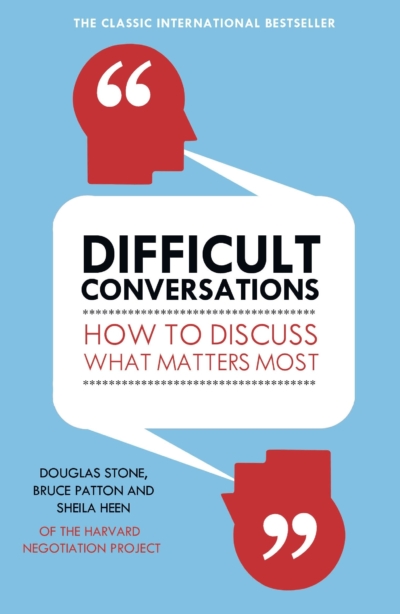When was the last time you absolutely dreaded a difficult conversation you knew had to take place at some time or another? Or put it off, or avoided it altogether? It isn’t unusual.
Take a step back and work is all about communicating, whether it’s by email, on the phone, virtually or face-to-face. Examine the corpxorate landscape and you soon see that, in a work context, the conversations we have are often difficult for one reason or another. Those scenarios that challenge us, push us and prod us – sometimes painfully!
Difficult conversations are part of working life, especially when you manage or lead others. And every one of us, no matter how senior or ‘together’ we are, tend to naturally avoid them. The thing is, difficult often translates as ‘essential’. It makes sense to get better at having them. But, like anything else new, it takes practice.

What denotes a ‘difficult’ conversation at work?
If you’ve ever put off asking for a salary raise because it’s too difficult to talk about, you’re not alone. Typical difficult topics include things like money talk, having to tell someone they’re not performing as well as expected, asking for things that maybe we feel, deep inside, we don’t deserve, mistakes we need to admit to and having to discipline someone.
Any topic you’re reluctant to bring up can become instantly difficult, which is why so many of us fear of the consequences. Even worse, these conversations often have a subtext, where everyone concerned actually thinks and feels a lot more than they actually express. It’s fraught with emotion and potential risk. And when handled less than well, it feels bad or at very least, extremely awkward.
The issues – Timing, head-space and choice

There’s a timing issue inherent in tricky conversations. It’s sometimes best to approach the matter quickly, without waiting too long, having the conversation at the raw edge of working life, at a relevant time when something has just happened or a situation has just arisen. On the other hand, to be good at having tricky conversations you need to be certain of your intentions, clear about the outcome you would like. You need to feel convinced that your goals are realistic and feasible. This means having the right amount of headspace to think through what you want to say first.
There’s always a choice, of course. Do you want to have this conversation right now? Or at all? You can choose not to. Is this the best time to hold it? If yes, when, where and how can you do it? If no, when is a better time? If you are telling yourself that the difficult conversation is better never held, then before you set that decision in stone, be honest with yourself about whether the issue is really going to go away or not. If you are still convinced that it will, then let the steam go out of the situation and see how it goes from this point onwards. You may or may not have to reevaluate later down the line. Hold your decision lightly and watch, as you may need to intervene differently in the future.
It’s also vital to be willing to actually listen, something that’s often half the battle. And you need to feel comfortable saying sorry if necessary, taking responsibility for your own contribution to an issue. It usually helps to plan, to give yourself space to prepare and think through how you’ll be discussing a challenging subject. What facts do you already have? Are they impartial or the opposite? What information are you missing?
Asking yourself what you are assuming can be incredibly insightful. Are your assumptions affecting your outlook on the conversation you’re about to have? Do you need to put them aside to listen and speak well so that you can give a fair hearing to everyone concerned?
Discuss what matters with more ease – The book we recommend
We think the book, Difficult Conversations – How to Discuss What Matters Most, is a really powerful resource for people wanting to make the best of difficult discussions. It comes from the Harvard Negotiation Project and provides a step-by-step approach to having tough conversations with less stress and more success.

The book reveals how to figure out the underlying structure of difficult conversations, and how to kick off a tricky discussion without coming across as defensive. It presents ways to listen for the hidden meaning behind what is not being said, examining the subtext as well as the things that are clearly expressed. It helps you remain balanced despite attacks and accusations, and it steers you away from unhelpful emotions towards productive problem solving. But best of all is the book’s key idea, which says there’s one or more deeper conversations hidden beneath every difficult one.
- A ‘what happened’ conversation concerns disagreement about what actually happened, what should have happened, and who is at fault. It’s important to understand the different interpretations of the events in question, and what is important to each person. Good resolution means everyone moves from their own views to being curious about the other person’s viewpoint.
- A ‘feelings’ conversation concerns both parties’ emotions, and the validity of those feelings. Expressing emotions openly is difficult, so we tend to avoid being too open. But unexpressed feelings fester and can stop us listening properly. Everyone involved needs to share their feelings clearly. While feelings might not be facts, they still matter.
- An ‘identity’ conversation is internal, the conversation we all have with ourselves, our inner voice that tells us about who we actually are. Identity matters a lot because difficult conversations can easily threaten a person’s sense of themselves, calling into question their competency, trustworthiness, worthiness, even their sense of being a good person. To navigate internal identity positively you need to know which issues are the most important to your identity, and know how to adapt it healthily. You then need to then be able to put yourself in the other person’s shoes, understanding as much as you can about how the issue up for discussion that may wobble their identity. Holding the conversation with this in mind, can soften your delivery and enable you to more sensitively handle the situation. This does not change the fact that the challenge still has to be delivered, but you may then become more supportive in your approach. You will also be more prepared for dealing with the other person’s emotional fall-out. One way or another, an identity quake will produce a strong reaction, ranging from stunned silence and/or tears to real anger.
Hints and tips
The key to having positive, effective, productive conversations is to recognise these deeper internal discussions, avoid the errors that can turn them into disasters, and transform tricky conversations into potential learning ones.
Part of it is about being curious. Once you know exactly what happened, you’ve got the facts straight from every angle. Which means you can express the multi-faceted meanings behind them, unpick them in a logical fashion, and be properly heard before the situation moves on. It’s often the only way to avoid confusion and upset, and pass through compromise to find a genuine resolution that everybody can live with.
Adaptive thinking involves rejecting all-or-nothing-style thinking. The easier you find it to admit your mistakes and confess to mixed intentions, the less threatening you’ll find the conversation and the more likely it’ll be to go well. Trying your best not to control the other person’s reactions matters too. It’s better to prepare for their reaction instead, going with more of the inevitable emotional flow that accompanies challenging conversations.
Do all this and you actually creating a third story, one beyond your own and the other person’s, and that’s where the magic happens. There’s much less of a sting to the conversation, it feels more comfortable and positive. When this happens and workable solutions emerge it feels satisfying and a measure of relief is experienced by all concerned.
We’ll help you handle conflict and hold difficult conversations better
If you would like to handle conflict and hold difficult conversations more effectively, contact us to discuss how our coaching can help you. We’ll be pleased to help you get where you want to be
About us:
We create the space for leaders to step back, think clearly, and navigate complexity with confidence. By sharpening the narrative that drives decisions, teams, and performance, we help leaders move forward with clarity and impact. Our approach blends deep listening, incisive challenge, and commercial focus—strengthening leadership at every level, from business transformation to boardroom decisions.
“We share resources that help coaches deepen their practice and expand their impact. The articles on this site are designed to spark fresh thinking, offer practical tools, and support the continuous growth of coaches at every stage. “
Jude Elliman
Founder
Our Core Approach:
We work with leaders to sharpen their thinking, strengthen their leadership, and navigate complexity with confidence. Our approach is built around three core areas:
Narrative Coaching – Working with the stories that shape leadership, teams, and organisations.
Commercial Focus – Cutting through complexity to drive clear, strategic decisions.
Challenge & Space – Asking the right questions while creating the space to reflect and grow.
Through this, we help leaders drive transformation, align teams, and make high-stakes decisions with clarity and impact.
